A
Industrial & Labor Leaders
________________________________________
Meet the people who played key roles in shaping the area's labor and industrial past. Through stories, photographs, and archival materials, these galleries honor the workers, organizers, innovators, and leaders whose efforts left a lasting impact on local communities and the broader labor movement.
Industrial Leaders
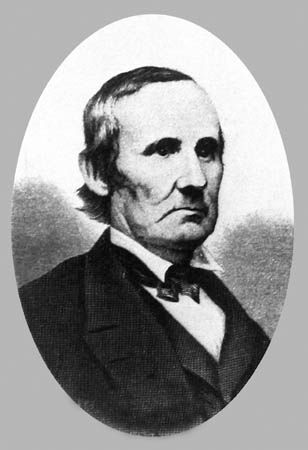
Colonel John Thomas
(1800-1894)
President of Belleville Pump & Skein Co.,
Builder of Thomas House
The Thomas family emigrated from Wales to Virginia and arrived in Illinois by 1807. The family constructed a portion of the old stage coach road from Vincennes, IL to St. Louis, MO (known as the Great Western Mail Route and later the National Road). Thomas participated in formulating the first State of Illinois Constitution and in the formation of the Republican Party.
Three generations of the Thomas family were capitalists who were influential in the manufacturing and business life of Belleville. Colonel John Thomas built Main Street's Thomas House in 1854 and became President of the Pump & Skein Works in 1877. In 1880, he published the Advocate Newspaper, and he became the owner of the Short Line Railroad in 1884. Thomas family members served as Circuit Judges and members of the State Legislature.
Three generations of the Thomas family were capitalists who were influential in the manufacturing and business life of Belleville. Colonel John Thomas built Main Street's Thomas House in 1854 and became President of the Pump & Skein Works in 1877. In 1880, he published the Advocate Newspaper, and he became the owner of the Short Line Railroad in 1884. Thomas family members served as Circuit Judges and members of the State Legislature.
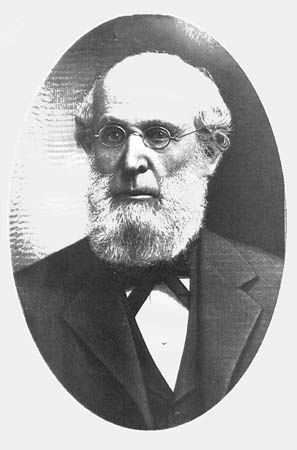
Edward Abend
(1822-1904)
4 Term Belleville Mayor, Attorney, & Capitalist Agent
His family moved from Germany to Belleville, IL, in 1833. Abend became an Agent for German Capitalists in 1852. He served as President of Belleville Savings Bank and was a four time Mayor of the City of Belleville. Because of his opposition to slavery, he was expelled from Democratic Party.
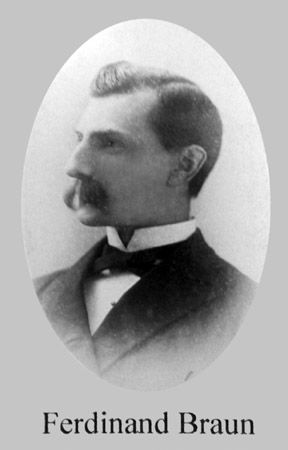
Ferdinand Braun
(1827-?)
Brick Manufacturer, Coal Mine Operator, Distillery Owner
Ferdinand Braun, a malster from Germany, owned coal mine lands, a dairy and a brickyard on the north side of Belleville where his father, Lorenzo, and George Bressler built a distillery in about 1840. In 1863, Ferdinand was the sole owner. By 1874, his interests turned to transportation, and he incorporated the Belleville City Railway Company. Belleville is credited with the first electric rail line in the State of Illinois. Braun and his wife, Wilhelmina, returned to Germany in 1891 and never returned to Illinois or America. His father, Lorenzo, and brother, Charles, invested heavily in Belleville but resided in St. Louis, MO.
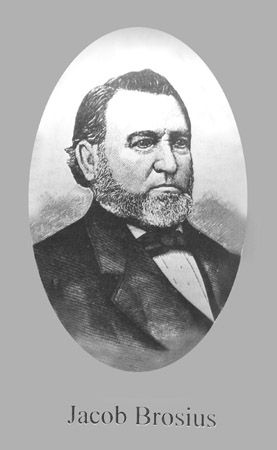
Jacob Brosius
(1824-1882)
Machine Shop Owner & Inventor
Jacob Brosius was a mechanic and an inventor who came directly to Belleville in 1849. His products reflect the hand of man. He held at least 7 patents for agricultural equipment improvements and 3 for radiators and steam conducting pipes. His foundry and machine shop was prosperous, and his castor, linseed and pecan oil business was even more so. In 1876, he built a very pretentious, palatial style home on a hill overlooking east Belleville. He called it "Kronthal". In 1879, he built the works for heating the City. His "Electric Clock" located in his residential tower was connected with other public clocks in the City. He died in 1882, age 59.
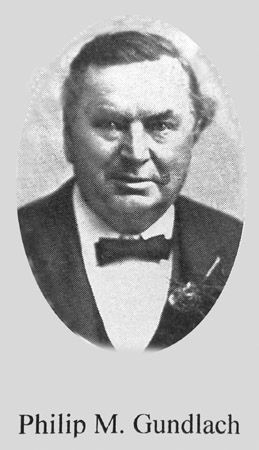
Philip Gundlach
(1831-1908)
Industrialist, Inventor
The Gundlachs manufactured tools of their own invention. Immediately after the Civil War, Philip M. Gundlach built a new iron foundry powered with Gundlach coal. His son, Joseph, operated the railroad to transport the coal. The P.M. Gundlach Agricultural Mfg. Co. was staffed by his sons: Philip A., Gen. Mgr.; John P., Engr.; Aloys, foreman. They manufactured grain drills, cleaners, hay rakes, wheel hubs and more modern products such as "Packing for Piston Rods and the like". The family emigrated from Frankfurt, Germany in 1842. The 20th Century Gundlachs were equally inventive. Some were self-educated machinists and tool designers. They respected foundry practices. Gundlach companies include: Gundlach Machinery, founded 1908; T.J. Gundlach Machine Co., founded 1919; Beno J. Gundlach Machine Co., founded 1927; Gundlach Roofing ca. 1900; Specialty Tool ca. 1920.
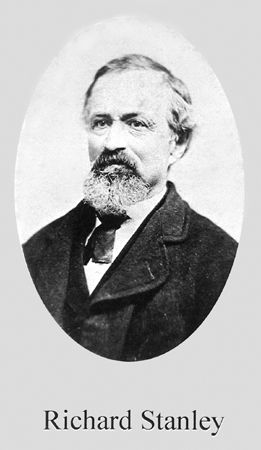
Richard Stanley
(1835-1910)
Nail Mill Owner
The Stanley family traveled from New York to PA, SC, NC and finally to Illinois. John and Elizabeth purchased land at Ogles Station in the west end of Belleville. By 1824, Brother Stanley was hosting Methodist church sessions, and Stanley women had married into the Ogle and Phillips pioneer families. Richard Stanley served in the Civil War, learned the nailing trade and returned to Ogle Station to open a nail mill. As many farmers did, he mined coal for fuel. In 1874, Zachariah Stanley sold the farm he had lived on for more than 50 years to the Hazard/Wilson Mining Co. Richard moved his nail mill enterprise to a rapidly developing industrial area near Grand, Douglas and East B Streets. Stanley made wire nails, cut nails, tacks and all sizes of staples.
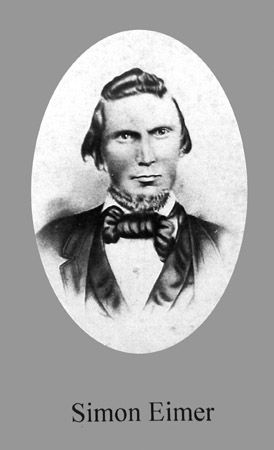
Simon Eimer
(1812-1866)
Brewing Industry Pioneer
Simon Eimer became one of the wealthiest industrialists of his day -- a biographer states: "Eimer was prominent in every activity good for a city". He arrived in 1844. In 1848, he built a bath house, followed by an entertainment park south of the Public Square and a hall on West Main Street. He served as a member of the Board of Education. As an alderman, he was appointed to a committee to plan for a new Market Square, a new Engine House and a new City Hall. He was a pioneer in the brewing industry of the Mississippi Valley and opened the Washington Brewery in 1846. The rebuilt brewery in 1859 was the largest brewery west of the Allegheny Mountains. The cellars were two stories deep in the ground. His nephew, John, also emigrated from Germany to help him manage his affairs which included investments in New Orleans and California.
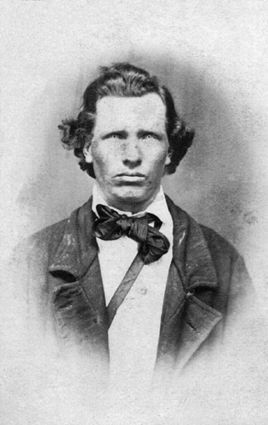
Theopolis Harrison
(1831-1908)
President of Harrison Machine Works
In 1803, Reverend Thomas Harrison, grandfather of Theopolis, arrived in Illinois, an unknown wilderness. Ten years later he built a cotton gin, the beginning of a very successful milling business. Harrison, who migrated from N. Carolina, was of Scotch-Irish descent. He had 10 children. By 1831 the Harrisons built the first steam operated mill in the State. The mill, at the west end of Main St. on Richland Creek, burned and was rebuilt. By 1844 Harrison Mills reported annual sales of a million dollars.
Another Harrison enterprise in Belleville was Harrison Machine Works. Theopolis Harrison, a grandson of Rev. Thomas, invested in Middlecoff's Agricultural Equipment Foundry in 1855. For 95 years HMW manufactured threshing machines, steam engines, straw carriers and pea pickers. It should be noted that in 1838 Thomas Harrison served as "President" of the Town of Belleville. In addition to his milling enterprise, Harrison built the "Mansion House" in 1840. It was the site of many historical happenings in Belleville including the infamous visit of Charles Dickens. The Lincoln Theatre replaced the Mansion House in 1920.
Another Harrison enterprise in Belleville was Harrison Machine Works. Theopolis Harrison, a grandson of Rev. Thomas, invested in Middlecoff's Agricultural Equipment Foundry in 1855. For 95 years HMW manufactured threshing machines, steam engines, straw carriers and pea pickers. It should be noted that in 1838 Thomas Harrison served as "President" of the Town of Belleville. In addition to his milling enterprise, Harrison built the "Mansion House" in 1840. It was the site of many historical happenings in Belleville including the infamous visit of Charles Dickens. The Lincoln Theatre replaced the Mansion House in 1920.
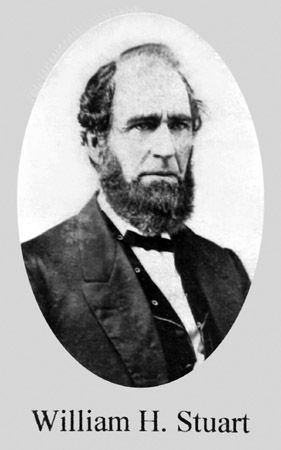
William H. Stuart
(1813-?)
Marble Dealer & Stone Cutter
William H. Stuart, a marble dealer and stone cutter, sold drugs as a sideline. He emigrated from Pennsylvania in 1816. His brother, Edward R. Stuart, was a partner in the publishing of the News-Democrat in 1859. They were significant land owners in south Belleville, and in 1864, Washington Public School was built on 14 of their lots. In 1819, their father, Alphonzo, was killed in the infamous Stuart-Bennett duel -- the only pistol duel fought in the history of the State of Illinois. It has not been determined who raised the two orphans
